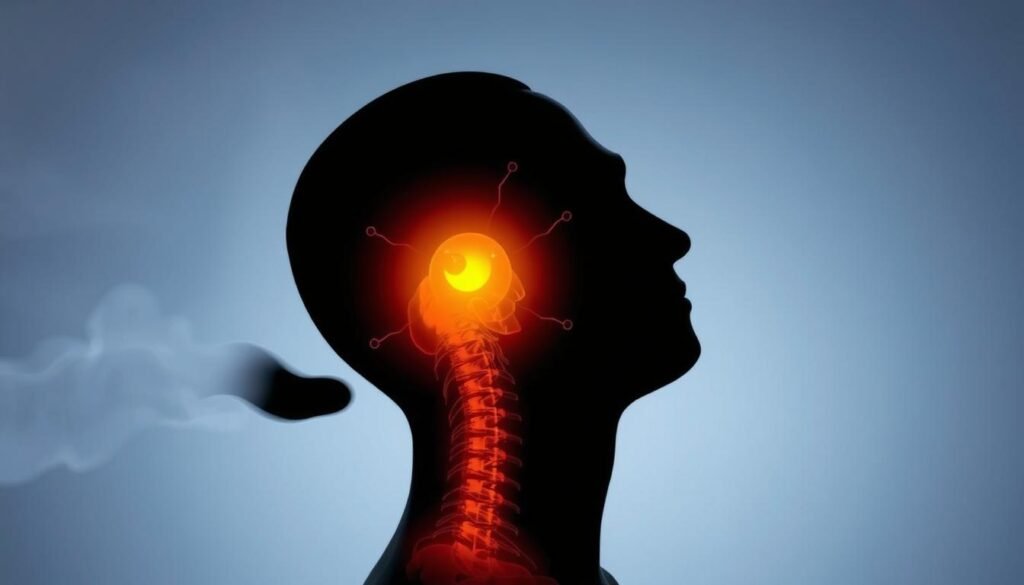Did you know muscle weakness impacts about 25% of older adults? It’s linked to many health issues. As folks get older, muscles often become weaker and smaller. This can cause sore neck fatigue muscle weakness, affecting a person’s health greatly. Conditions like a sedentary lifestyle, cervical strain, or mental health issues like anxiety and depression can lead to this. Such neck pain takes a toll on your daily life and happiness.
This article will help you understand the connection between sore neck, fatigue, and muscle weakness. You’ll learn about the causes and find useful tips for relief. Getting to know how neck pain and muscle fatigue are related can guide you in improving your health and wellness.
Key Takeaways
- Muscle weakness is often caused by aging, lack of exercise, or specific health conditions.
- Sore neck fatigue can severely impact overall well-being and daily functioning.
- Poor posture and sedentary lifestyles contribute significantly to neck pain.
- Certain chronic disorders and injuries can lead to muscle fatigue and weakness.
- Addressing both physical and emotional aspects is crucial for effective treatment.
Understanding Sore Neck Fatigue Muscle Weakness
Sore neck fatigue muscle weakness can greatly affect your life. People with this condition often describe ongoing neck pain and tiredness. These issues can get worse with cervical strain and muscle spasms. This leads to muscle weakness, making everyday tasks difficult.
Muscle fatigue feels different from real muscle weakness. Fatigue is about feeling really tired, which makes everything seem harder. Muscle weakness means losing actual muscle strength. It’s important to know the difference for the right treatment.
Many things can cause sore neck fatigue muscle weakness. Cervical strain is one, often from bad posture, injuries, or doing the same motion a lot. This strain can cause severe neck pain and make muscles weaker. Neck pain can keep happening, causing muscle spasms that make you more tired.
It’s crucial to recognize symptoms of sore neck fatigue muscle weakness in everyday life. Knowing what’s happening allows you to get the right help. This way, you can deal with the root problems and feel better overall.
Common Causes of Muscle Weakness
Muscle weakness comes from many sources. It’s key to know these causes to tackle muscle fatigue effectively. It greatly impacts our day-to-day lives. Knowing the difference between true muscle weakness, feeling tired, and quick fatigue is vital. This knowledge helps us find the best way to get better and feel stronger.
Overview of Primary Muscle Weakness
Primary muscle weakness is when muscles can’t do their normal tasks because they are not working right. This happens due to reasons such as nerve problems or muscle diseases. As people get older, they often lose some muscle strength in a process called sarcopenia, starting at about 40. Diseases like fibromyalgia, stroke, and autoimmune disorders also play a part, which makes recovery tougher.
Understanding Muscle Tiredness vs. Fatigability
Muscle tiredness means you feel worn out when doing physical stuff, lowering how well you perform. Fatigability is when muscles get tired fast during effort. Not exercising enough and certain health issues can make these feelings worse. Those with long-term illnesses may face ongoing muscle tiredness, showing why it’s important to check in regularly and act to improve the situation.

| Condition | Description |
|---|---|
| Aging (Sarcopenia) | Loss of muscle mass and strength typically beginning around age 40. |
| Neurological Disorders | Conditions like multiple sclerosis and ALS that can result in muscle weakness. |
| Chronic Conditions | Diseases such as fibromyalgia and chronic fatigue syndrome that often present with muscle fatigue. |
| Infections | Viral infections, like the flu, which may lead to temporary muscle weakness. |
| Medications | Certain drugs, especially statins, known to induce muscle fatigue as a side effect. |
How Neck Pain Contributes to Muscle Weakness
Neck pain is a big factor in muscle weakness. It leads to muscle atrophy and less endurance. People with chronic neck pain often face more severe muscle weakness. This is due to issues in the neck that limit movement.
There was a study with 46 patients who had cervical radiculopathy and 34 people without symptoms. The results showed those with neck pain had lower endurance. They struggled more in activities lying down, both on their back and stomach. This shows that neck pain greatly affects muscle endurance and increases fatigue.
The study used surface electromyography (EMG) to look at muscle fatigue. Patients had more side imbalances and showed greater fatigue than their pain levels suggested. This means that neck pain, through not moving much, can cause more muscle weakness over time.
Bad posture also plays a role in neck pain and muscle weakness. Using digital devices often leads to poor posture. This increases the chance of muscle fatigue in the neck and shoulders. Physical therapists suggest exercises like shoulder squeezes and chin tucks. These can help strengthen the neck and upper back, reducing muscle weakness from neck pain.

| Parameter | Cervical Radiculopathy Patients | Asymptomatic Subjects |
|---|---|---|
| Median Frequency Slope | Greater Negative Slope | Stable Slope |
| Side Imbalance | Significant Imbalance | Minimal Imbalance |
| Endurance Time (Prone) | Lower | Higher |
| Endurance Time (Supine) | Lower | Higher |
| Fatigue in Upper Trapezius | More Significant | N/A |
| Fatigue in Sternocleidomastoid | More Significant | N/A |
In summary, neck pain and muscle weakness are closely linked. Working on neck issues with the right posture and exercises can improve muscle strength. This reduces weakness and fatigue.
The Role of Poor Posture in Developing Neck Issues
Poor posture is a big reason for neck problems. Globally, about 2500 people out of every 100,000 suffer from neck pain. A lot of this is due to sitting too much, especially when using computers or smartphones. Sitting or standing the wrong way can make your muscles tired and sore. This can even cause stiffness.
Impact of Sedentary Lifestyle on Neck Health
Living a sedentary life often means sitting or standing badly for too long. This puts extra pressure on your neck. Studies show that bad posture can hurt your neck’s curve, leading to pain. Not just that, but it can cause more problems too.
For example, sitting too much can mess up your blood flow, which might cause varicose veins. It can also squash your muscles, making it hard for your body to digest food properly. This sets off a bunch of health issues.
Preventive Measures for Posture-Related Pain
Fixing your posture early can really help your neck stay healthy. Here are some tips to keep in mind:
- Maintain proper desk ergonomics to promote better posture.
- Incorporate regular breaks during long work periods to relieve stress on muscles.
- Engage in neck-strengthening exercises to reduce stiffness.
- Mindfully adjust posture while using devices or typing to prevent strain.
- Avoid carrying heavy backpacks on one shoulder to balance bodily stress.
Taking these steps can lessen neck pain caused by bad posture. Knowing how to sit or stand correctly is very important. It helps us develop good habits that support our health. If you’re interested in learning more about how posture affects you, check out more here.

Sore Neck Fatigue Muscle Weakness: Associated Conditions
Sore neck, fatigue, and muscle weakness often go hand in hand with chronic pain conditions. Getting to know these related conditions can help us understand why symptoms get worse. Fibromyalgia and myofascial pain syndrome are common with neck pain.
How Fibromyalgia Symptoms Manifest
The way fibromyalgia shows itself can vary a lot from person to person. Pain is usually widespread and can feel like aching, a burning sensation, or sharp pains. This is often in the back and neck. Things like stress, changes in the weather, and physical activity can make it worse.
Symptoms also include bad sleep and severe fatigue, making everyday tasks tough. Fibromyalgia can also lead to “fibro-fog,” which affects thinking, headaches, and stomach issues like IBS. This shows how complex the condition is.
Myofascial Pain Syndrome Explained
Myofascial pain syndrome involves muscles becoming tight and tender, with specific trigger points causing pain and stiffness. This can make neck muscle weakness worse, leading to discomfort and reduced strength. The pain is often ongoing and worsens with movement or pressure. This highlights the need to spot what causes neck issues and chronic pain, helping tackle fatigue.
Treatment Options for Neck Pain and Muscle Weakness
Trying to manage neck pain and muscle weakness involves many steps. A mix of treatments can help ease discomfort and make you function better. People get helped in different ways, based on what they need.
Physical Therapy and Rehabilitation Techniques
Physical therapy stands out as a key way to feel better. It not just eases pain but also makes neck muscles stronger and more flexible. In rehabilitation, some methods used are:
- Individualized exercise programs
- Manual therapy to reduce tension and improve range of motion
- Education on posture and ergonomic practices
- Use of modalities like ultrasound and electrical stimulation
Therapists use these methods to help patients heal from injuries and get stronger. Looking into alternative therapies can also give more energy and wellness.
Medication Relief for Chronic Pain
Medicines are crucial for managing long-lasting pain. Simple painkillers like ibuprofen or acetaminophen work well for slight pain. Sometimes, doctors may suggest stronger medicines depending on what you need. They might recommend:
- Prescription NSAIDs for more severe pain
- Muscle relaxants to ease tension
- Antidepressants or anticonvulsants for nerve pain
It’s very important to talk with a doctor if pain stays around. They can decide on the best medicine and create a plan that might include other treatments.
Home Remedies and Lifestyle Changes for Relief
Home remedies and lifestyle changes are key to reducing sore neck fatigue and muscle weakness. Adding stretching and strengthening exercises to your day makes muscles stronger and more flexible. This leads to healthier necks. Small changes in how you live can also boost your overall wellness and make symptom management easier.
Effective Stretching and Strengthening Exercises
Doing stretching exercises regularly loosens tight muscles and improves blood circulation, aiding recovery. Important stretches include:
- Neck tilts: Gently tilt your head towards each shoulder, holding for 15 seconds.
- Chin tucks: Pull your chin back to align the head over the shoulders.
- Shoulder shrugs: Raise your shoulders towards your ears and then release.
Adding strengthening exercises to your routine also helps keep your neck stable. Consider trying these exercises:
- Resistance band exercises for better muscle control.
- Isometric exercises by pushing against something without moving your head.
Following these exercise routines can greatly reduce discomfort and make muscles work better. Staying active is essential; try to get 150 minutes of moderate activity every week. You can find more about other therapies and home treatments here.
The Importance of Proper Sleep Position
Your sleep position greatly affects neck health. Spending seven to eight hours in bed impacts how you rest and recover. The right pillow aligns your spine, lessening strain. Follow these tips for a better sleep position:
- Pick a pillow that suits your sleeping style—taller for side sleepers, thinner for those who sleep on their backs.
- Try not to sleep on your stomach to avoid twisting your neck in odd ways.
Adopting these habits can reduce discomfort and make daily activities easier. Small lifestyle tweaks can greatly decrease neck and back pain.
When to Seek Professional Help
Knowing when to get help for neck pain, fatigue, and muscle weakness is very important. If you have ongoing or very bad symptoms, don’t wait to see a doctor. If you feel a lot of neck pain, numbness, or weakness in your arms, you need medical help right away.
Recognizing Symptoms that Require Medical Attention
Being aware of certain symptoms can help you get the right help in time. You should see a doctor if you notice:
- Severe neck pain that doesn’t improve after three weeks
- A history of accidents, like car crashes or sports injuries
- Symptoms such as incontinence, high fever, or trouble breathing
- Muscle weakness that comes with neck pain
- Neck pain in people over 50, which might be due to conditions like osteoarthritis
What to Expect During a Medical Evaluation
A doctor’s visit usually starts with a detailed look at your symptoms. They will ask about when the pain started, check your body, and might suggest tests like:
| Diagnostic Test | Purpose |
|---|---|
| X-rays | To find fractures or issues with the spine’s structure |
| Magnetic Resonance Imaging (MRI) | To check soft tissues and confirm things like herniated discs or tumors |
| Cervical Spine CT Scan | To get clear pictures of neck bones |
| Blood Tests | To look for infections or diseases that cause inflammation |
Getting help early can lead to better health. Addressing neck pain and muscle weakness quickly helps avoid worse problems and improves your life.
Conclusion
Looking closely at sore neck, fatigue, and muscle weakness shows us how much our neck health impacts our life. Many strategies for relief were covered, from changes in lifestyle and home cures to professional help. This ensures people find their way to get better. It’s key to know how things like muscle strain, injuries, and bad posture contribute to neck pain for better management.
By understanding neck problems and knowing how to fix them, people can tackle their pain well. It’s super important to keep our necks healthy by doing things like staying in good posture and exercising the right way. This approach greatly boosts our well-being.
If someone’s neck pain won’t go away or is really bad, they should get medical help fast. Knowing a lot and acting quickly can truly help with healing and handling pain. Reading up on it, like what this study shows, brings more ideas on dealing with sore neck, fatigue, and muscle weakness for better health.